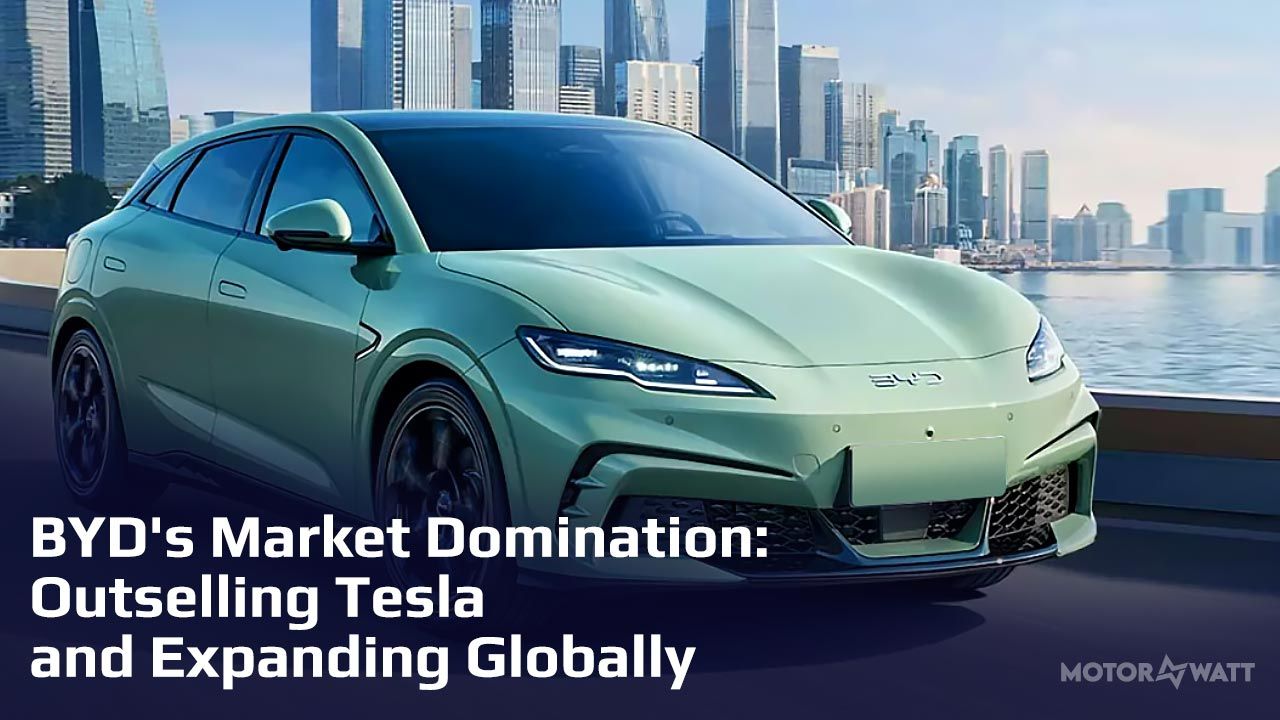BYD's Market Domination: Outselling Tesla and Expanding Globally BYD Surpasses Tesla in China’s EV Market
Share this article in Social Media:

BYD is dominating the Chinese EV market, selling nearly 300,538 NEVs in January 2025—almost five times Tesla's sales. With a 26.9% market share in China, expansion into Singapore and the UK, and a focus on affordability and advanced technology, BYD is rapidly becoming a global EV leader.
In the race for EV supremacy, Tesla is feeling the heat from BYD, China’s homegrown powerhouse. January 2025 saw BYD selling a staggering 300,538 new energy vehicles (NEVs)—battery electric and plug-in hybrids—marking a 49.16% surge from the previous year. Tesla, in contrast, only moved 63,238 China-made EVs, an 11.5% dip year-over-year. That puts BYD ahead by nearly fivefold in the Chinese market.
- BYD’s market share hit 26.9% in January 2025.
- Tesla ranked sixth with just 4.5% of the NEV market.
- BYD continues to dominate with both BEVs and PHEVs.
BYD’s Global Expansion Gains Momentum
BYD isn’t just winning in China—it’s making serious moves worldwide. From Singapore to the UK, the company is proving that its affordable, tech-packed EVs can compete with legacy automakers and new-age disruptors alike.
BYD Becomes Singapore’s Best-Selling Car Brand
Singapore’s love affair with BYD reached new heights in 2024 when the company topped the country's auto sales charts. With 6,191 units sold and a 14.39% market share, BYD dethroned giants like Toyota and Tesla. This marked the first time a Chinese EV brand led the Singaporean market.
- BYD’s Singapore sales grew sharply, reaching 14.39% of the total market.
- Outpaced competitors like Toyota and Tesla for the top spot.
- Strong demand driven by affordability and advanced features.
BYD’s Explosive Growth in the UK
The UK market has also witnessed BYD’s rapid rise. Since launching the ATTO 3 SUV in March 2023, BYD has expanded from 14 retail locations to 60 by the end of 2024. That aggressive strategy fueled a massive 658% increase in sales, pushing BYD’s market share from 0.17% to 0.96% in just a year.
- BYD UK sales surged 658% in 2024.
- Retail network expanded from 14 to 60 locations.
- Market share climbed from 0.17% to 0.96% by December 2024.
Why BYD is Winning: Strategy and Innovation
BYD’s ascent isn’t just about volume—it’s a strategic play that combines affordability, innovation, and global expansion. Here’s how the company is outmaneuvering Tesla and traditional automakers.
Affordable Advanced Technology
One of BYD’s biggest advantages? High-tech features at no extra cost. Unlike Tesla, which charges premiums for features like advanced driver assistance systems (ADAS), BYD offers these as standard. This makes BYD’s EVs a no-brainer for budget-conscious consumers who don’t want to compromise on technology.
- ADAS included in most models at no extra cost.
- Competing brands charge extra for similar technology.
- Strong appeal to price-sensitive buyers.
Diverse Model Lineup
While Tesla relies on a handful of high-profile models, BYD is flooding the market with options. Whether it’s budget-friendly city EVs or premium luxury models, there’s a BYD for every type of driver. This broad lineup gives BYD an edge in markets where consumer preferences vary widely.
- Wide range of vehicles from affordable to high-end models.
- Appeals to different income levels and market segments.
- Competitive offerings across multiple categories.
Global Manufacturing Expansion
BYD’s international strategy isn’t just about selling cars—it’s about making them close to the customers. By setting up manufacturing plants in key regions, the company reduces tariff risks and keeps pricing competitive. This approach is critical as governments around the world impose stricter trade policies.
- Manufacturing plants in multiple key markets.
- Reduces exposure to tariffs and trade restrictions.
- Ensures competitive pricing and localized production.
BYD’s Future: Will Tesla Catch Up?
With its current trajectory, BYD isn’t just competing with Tesla—it’s positioning itself as a global EV leader. The combination of aggressive pricing, market expansion, and consumer-focused innovation makes it a force to be reckoned with. While Tesla still dominates in the high-end EV segment, BYD’s broader appeal could make it the true mass-market champion.
- BYD’s pricing strategy undercuts Tesla’s premium model.
- International growth accelerating beyond China.
- Technology and affordability continue to drive demand.
Whether Tesla will bounce back or if BYD will cement itself as the world's top EV maker remains to be seen. But for now, the numbers speak for themselves—BYD is on a winning streak, and it doesn’t look like it’s slowing down anytime soon.
BYD has firmly established itself as the leading EV manufacturer in China, outselling Tesla nearly fivefold in January 2025 with 300,538 NEV sales compared to Tesla’s 63,238. BYD’s market share in China reached 26.9%, while Tesla held just 4.5%.
Beyond China, BYD has successfully expanded into international markets. In Singapore, it became the top-selling car brand in 2024, surpassing Toyota and Tesla with a 14.39% market share. In the UK, BYD saw a staggering 658% increase in sales in 2024, expanding its retail network from 14 to 60 locations and growing its market share to 0.96%.
BYD’s success is driven by strategic initiatives, including offering advanced technology at no extra cost, a diverse product lineup catering to various market segments, and a global manufacturing footprint that helps mitigate trade barriers.
Conclusion
BYD’s combination of affordability, cutting-edge technology, and aggressive global expansion has positioned it as a formidable competitor in the EV industry. While Tesla remains dominant in the high-end segment, BYD’s mass-market appeal and rapid growth suggest that it could soon become the world’s leading EV manufacturer. If Tesla hopes to regain lost ground, it will need to adapt to BYD’s competitive pricing and innovation-driven strategy.


